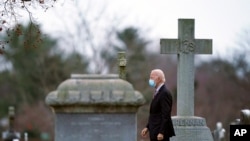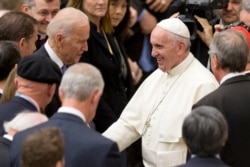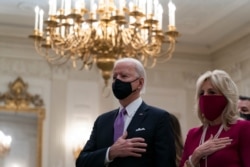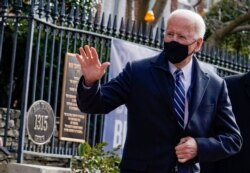Joe Biden, only the second Roman Catholic to lead the United States, is already placing his faith front and center of his presidency.
During the transition and his first month in office, the president attended Mass weekly and also goes to church on his religion's major holidays. At his inauguration, a Jesuit priest offered the invocation. And in his initial speech as president, Biden quoted St. Augustine, a key early church philosopher.
Behind Biden’s desk in the Oval Office is a photo of him meeting Pope Francis. At Monday evening’s White House ceremony marking 500,000 coronavirus deaths in the country, the president made the sign of the cross, as a military band concluded playing the Christian hymn “Amazing Grace.”
“This is a guy who carries a rosary around in his pocket and talks about his faith,” noted Father Thomas Reese, a Jesuit priest and senior analyst for the Religion News Service, who described Biden as a “traditionally pious Catholic.”
Unlike in 1960, when 78% of Catholics voted for their co-religionist, John F. Kennedy, American Catholics in 2020 were evenly split between Biden and incumbent President Donald Trump, reflecting the contemporary U.S. political divide in the faith.
“We’re one of the few religious groups for whom that is true,” Reese told VOA. “Most Jews vote Democratic, most Black Protestants vote Democratic, and most white evangelicals vote Republican.”
About one in five Americans identify as Roman Catholic.
Mixed views among Catholics
The hierarchy of the Catholic Church in the United States also seems to have an initial dual view of Biden, stemming in great part from the new president’s stance on abortion.
The U.S. Conference of Catholic Bishops, which stresses it is a nonpartisan group that works with all presidents, says it is refreshing to engage with Biden, as he “clearly understands, in a deep and personal way, the importance of religious faith and institutions.”
The bishops’ Inauguration Day statement, released in the name of Los Angeles Archbishop Jose Gomez, president of the bishops’ conference, noted, however: “I must point out that our new president has pledged to pursue certain policies that would advance moral evils and threaten human life and dignity, most seriously in the areas of abortion, contraception, marriage, and gender. Of deep concern is the liberty of the Church and the freedom of believers to live according to their consciences.”
In a quick reaction viewed as unprecedented, Cardinal Blase Cupich of Chicago tweeted his criticism of the statement, calling it “ill-considered.” And Cardinal Wilton Gregory, archbishop of Washington, told NBC News the statement was “ill-timed.”
Other U.S. bishops expressed support for Gomez’s statement, with one prominent cleric even more blunt in criticizing Biden.
“The president should stop defining himself as a devout Catholic and acknowledge that his view on abortion is contrary to Catholic moral teaching,” Archbishop Joseph Naumann of Kansas City, Kansas, told The Catholic World Report magazine.
“The Catholic bishops are attacking Biden because he is not following their agenda of making abortion illegal or more difficult in the United States,” Reese noted. “He's just not on board on that, and many of them feel that is a moral risk, that it is a moral responsibility for a Catholic to do that. And if you don't do that, you're a bad Catholic.”
Keeping faith out of politics
Biden actually does not disagree with church teaching on abortion, according to Reese.
“What he is saying is that he, as president of the United States, cannot impose his views on other people, on people who are not Catholic,” Reese said.
In his 2007 memoir “Promises to Keep: On Life and Politics,” Biden wrote that he does not "have a right to impose my view on the rest of society."
As a senator, he voted repeatedly to uphold a ban on federal funding for abortions. But as president, he said the ban should be lifted.
Biden’s stance on reproductive rights has led some prominent church figures to suggest he should not present himself for Holy Communion, a requirement for the faithful.
“When Catholics receive the Eucharist, they are acknowledging the real presence of Jesus and also belief in the teachings of the church,” Naumann said. “President Biden doesn’t believe in the church’s teachings on the sanctity of human life, and he should not put the priest in the situation where he has to decide whether or not to allow him to receive the Eucharist. He should know that after 78 years as a Catholic.”
One priest in South Carolina did refuse to grant Holy Communion to Biden when he campaigned there in 2019.
As was the case with Kennedy's ancestors, some of Biden's immigrated from Ireland in the late 19th century, bringing their faith to a Protestant America that considered their rituals “wrong” and worried they were colonizing the continent for the pope. Such prejudice existed well into the 20th century in the United States.
Kennedy’s candidacy generated fears he would be a papal puppet, doing the pope’s bidding in the White House.
"I am not the Catholic candidate for president," Kennedy said to a Protestant group in a 1960 speech in Houston. "I am the Democratic Party's candidate for president, who happens also to be a Catholic. I do not speak for my church on public matters, and the church does not speak for me."
Kennedy secured his party’s nomination that same year after a victory in the predominantly Protestant state of West Virginia where he told voters, “I refuse to believe that I was denied the right to be president the day that I was baptized.”
It was not until the presidency of Jimmy Carter, a Baptist, that the White House felt comfortable to invite a pope inside.
At odds with church doctrine
Now, some in the Vatican, ironically, fret that Biden is working at odds with church doctrine and find themselves allied with the evangelical Protestants, who opposed Kennedy solely because he was on the other side of Christianity.
It is not just the subject of abortion, however, on which Biden finds himself facing criticism. Many of the faithful also object to his liberal views on same-sex marriage and gender identity.
In his welcome message to Biden, the pope was more diplomatic than his American bishops.
“At a time when the grave crises facing our human family call for farsighted and united responses, I pray that your decisions will be guided by a concern for building a society marked by authentic justice and freedom, together with unfailing respect for the rights and dignity of every person, especially the poor, the vulnerable and those who have no voice,” the pontiff wrote.
Observers, including Reese, predict the Holy See will use its diplomatic skills honed over two millennia of dealing with superpowers to emphasize common ground with the Biden administration.
“The Vatican is very smart. They know that the best thing they can do is work with governments in the areas where they have mutual interests and agreements,” Reese said. “They did that with Bill Clinton. They did it with other presidents. And did it even with Trump” — a baptized Presbyterian who eventually identified as a nondenominational Christian.
Biden’s Catholic supporters point to his stances on human rights, economic justice and concern for the poor as more closely aligning with their religion’s social teaching than many previous presidents. They say he is following in the theological footsteps of Jesus, who equated serving or neglecting the downtrodden with serving or neglecting God.



